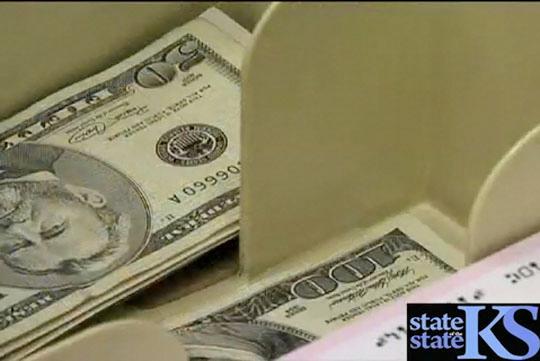VIDEO: State employee retirement plan $7.7 billion underfunded
January 19, 2011
KPERS Facing $7.7 Billion In Unfunded Liability
The Executive Director of the Kansas Employees Retirement System or KPERS testified at the capitol Tuesday that the program that covers retirement pensions for public employees, including, teachers, judges and police officers, was underfunded by $7.7 billion.
The program is low on funds because of investments that lost value with the Wall Street crash in 2008 and because the state has not been contributing at the necessary rate to support the state employees’ retirement plan.
KPERS Executive Director Glen Deck said, “It’s that type of situation that if we don’t take additional steps to address the shortfall, we’re particularly vulnerable to market downturns and it’s just a matter of time.”
Options to fix the problem include increasing the amount the amount the state contributes to employees’ retirement, making public employees pay more toward pension plans and creating a mandatory contribution plan for future employees.
Everyone agrees the state is facing a funding problem. In fact research by the Pew Center For The States ranks Kansas as the 2nd worst underfunded pension plan in the nation. But legislators want to hear more from two special committees formed to address the problem.”
“But we have two separate committees, one in the House and one in the Senate that’s going to be looking at this,” said Senate Ways and Means Chairwoman Carolyn McGinn (R). “Hopefully out of the two chambers we can come up with some good ideas. We’re going to have to make some major fixes and they may not be palatable to everybody.”
The director of the KPERS pension system says that benefits for current state employees are safe, he says the state must address this problem soon before it gets bigger.
Kobach Introduces Voter ID Law
On Tuesday, newly elected Secretary of State Kris Kobach (R) proposed a law that would require voter identification at the election both, proof of citizenship to register to vote and give the Secretary of State the power to prosecute election fraud.
Critics of the plan responded to Kobach’s announcement with Democratic House Minority Leader Paul Davis saying Kobach had failed to show evidence of significant fraud in Kansas elections.
Davis said, “There has only been a handful of instances of voter fraud in Kansas in recent years. It’s not because we don’t prosecute, it’s because voter fraud doesn’t happen here. This is a solution in search of a problem.”
The bill will now face hearings in a House committee before it can head to the Kansas House and Senate.



